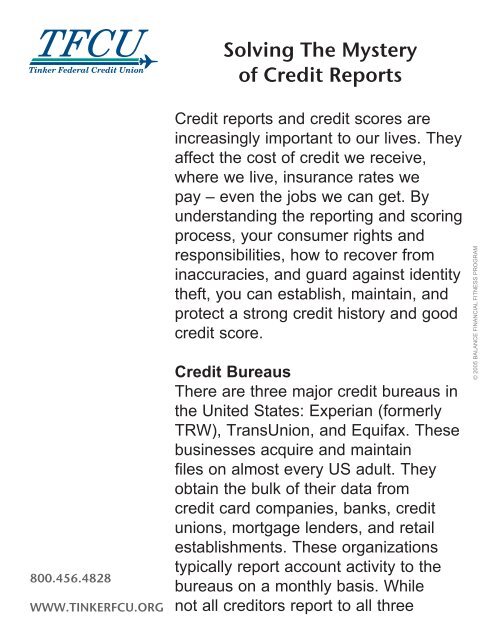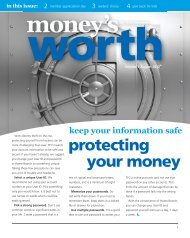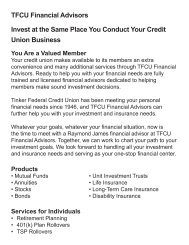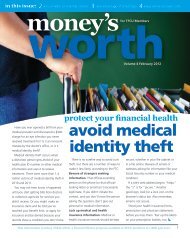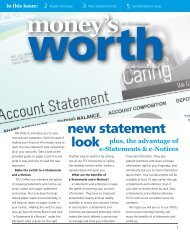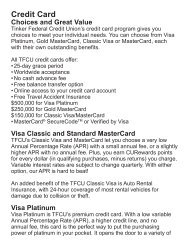Solving The Mystery of Credit Reports - Tinker Federal Credit Union
Solving The Mystery of Credit Reports - Tinker Federal Credit Union
Solving The Mystery of Credit Reports - Tinker Federal Credit Union
Create successful ePaper yourself
Turn your PDF publications into a flip-book with our unique Google optimized e-Paper software.
<strong>Solving</strong> <strong>The</strong> <strong>Mystery</strong><br />
<strong>of</strong> <strong>Credit</strong> <strong>Reports</strong><br />
800.456.4828<br />
www.tinkerfcu.org<br />
<strong>Credit</strong> reports and credit scores are<br />
increasingly important to our lives. <strong>The</strong>y<br />
affect the cost <strong>of</strong> credit we receive,<br />
where we live, insurance rates we<br />
pay – even the jobs we can get. By<br />
understanding the reporting and scoring<br />
process, your consumer rights and<br />
responsibilities, how to recover from<br />
inaccuracies, and guard against identity<br />
theft, you can establish, maintain, and<br />
protect a strong credit history and good<br />
credit score.<br />
<strong>Credit</strong> Bureaus<br />
<strong>The</strong>re are three major credit bureaus in<br />
the United States: Experian (formerly<br />
TRW), Trans<strong>Union</strong>, and Equifax. <strong>The</strong>se<br />
businesses acquire and maintain<br />
files on almost every US adult. <strong>The</strong>y<br />
obtain the bulk <strong>of</strong> their data from<br />
credit card companies, banks, credit<br />
unions, mortgage lenders, and retail<br />
establishments. <strong>The</strong>se organizations<br />
typically report account activity to the<br />
bureaus on a monthly basis. While<br />
not all creditors report to all three<br />
© 2005 BALANCE FINANCIAL FITNESS PROGRAM
credit bureaus, most do. <strong>The</strong> credit bureaus also acquire<br />
information by searching court records for lawsuits,<br />
judgments, and bankruptcy filings and by reviewing county<br />
records for tax, judgment, mechanic’s, or other liens (legal<br />
claims).<br />
All <strong>of</strong> the credit and public record data is compiled with<br />
your identification information and provided to creditors,<br />
insurance companies, employers, landlords, and anyone<br />
else who has a legitimate business use for the information,<br />
at their request.<br />
Consumers should check their credit report for accuracy at<br />
least annually. <strong>Reports</strong> may be ordered by contacting the<br />
credit bureaus:<br />
Experian<br />
Consumer Assistance<br />
PO Box 2104<br />
Allen, TX 75013-2104<br />
www.experian.com<br />
(888) 397-3742<br />
© 2005 BALANCE FINANCIAL FITNESS PROGRAM<br />
Trans<strong>Union</strong><br />
Consumer Relations<br />
PO Box 390<br />
Springfield, PA 19064-0390<br />
www.transunion.com<br />
(800) 916-8800
Equifax<br />
Consumer Relations<br />
PO Box 105783<br />
Atlanta, GA 30348<br />
www.equifax.com<br />
(800) 685-1111<br />
Because <strong>of</strong> the Fair and Accurate <strong>Credit</strong> Transactions Act<br />
(an amendment to the Fair <strong>Credit</strong> Reporting Act), you may<br />
also receive a free copy <strong>of</strong> your credit report once a year.<br />
<strong>The</strong> three credit bureaus have established one central<br />
website, telephone number, and mailing address to use for<br />
ordering your report. If you request the report online, you<br />
should be able to view it immediately.<br />
Annual <strong>Credit</strong> Report Request Service<br />
P.O. Box 105281<br />
Atlanta, GA 30348-5281<br />
www.annualcreditreport.com<br />
(877) 322-8228<br />
© 2005 BALANCE FINANCIAL FITNESS PROGRAM<br />
Fair <strong>Credit</strong> Reporting Act<br />
<strong>Credit</strong> bureaus are regulated by the <strong>Federal</strong> Trade<br />
Commission, and must comply with the Fair <strong>Credit</strong><br />
Reporting Act. This law is designed to promote accuracy,<br />
fairness, and privacy <strong>of</strong> information in the files <strong>of</strong> every<br />
“consumer reporting agency” (CRA). This includes credit<br />
bureaus, as they are considered CRAs. <strong>The</strong> FCRA ensures<br />
that:
• Anyone who uses information from a CRA to take action<br />
against you (such as denying an application for credit,<br />
insurance, or employment) must tell you, and give you<br />
the name, address, and phone number <strong>of</strong> the CRA that<br />
provided the consumer report.<br />
• At your request, a CRA must give you the information<br />
in your file, and a list <strong>of</strong> everyone who has recently<br />
requested it.<br />
• If you inform a CRA that your file contains inaccurate<br />
information, the CRA must investigate the item (usually<br />
within 30 days) by presenting to its information source<br />
all relevant evidence you submit (unless your dispute is<br />
frivolous). <strong>The</strong> source must review your evidence and<br />
report its findings to the CRA. <strong>The</strong> CRA must give you<br />
a written report <strong>of</strong> the investigation, and a copy <strong>of</strong> your<br />
report if the investigation results in any change.<br />
© 2005 BALANCE FINANCIAL FITNESS PROGRAM<br />
A CRA must remove or correct inaccurate or unverified<br />
information from its files. However, the CRA is not<br />
required to remove accurate data from your file unless it is<br />
outdated or cannot be verified.<br />
If the investigation does not resolve the dispute, you may<br />
add a brief statement to your file. <strong>The</strong> CRA must include<br />
a summary <strong>of</strong> your statement in future reports. If an item<br />
is deleted or a dispute statement is filed, you may ask that<br />
anyone who has recently received your report be notified<br />
<strong>of</strong> the change.
If your dispute results in any change to your report,<br />
the CRA cannot reinsert the information unless the<br />
information source verifies its accuracy and completeness.<br />
In addition, the CRA must give you a written notice telling<br />
you it has reinserted the item. <strong>The</strong> notice must include<br />
the name, address, and phone number <strong>of</strong> the information<br />
source.<br />
You can also dispute inaccurate items with the information<br />
source. When you file a dispute with a creditor, they may<br />
not report the information to a CRA without including a<br />
notice <strong>of</strong> your dispute. Once you’ve notified the source<br />
<strong>of</strong> the error in writing, it may not continue to report the<br />
information if it is, in fact, an error.<br />
• In most cases, a CRA may not report negative information<br />
that is more than seven years old (see “How Long<br />
Information Can Be Reported” for specific information).<br />
© 2005 BALANCE FINANCIAL FITNESS PROGRAM<br />
• A CRA may provide information about you only to those<br />
with a need recognized by the FCRA – usually to consider<br />
an application with a creditor, insurer, employer, landlord,<br />
or other business.<br />
• A CRA may not give out information about you to your<br />
employer, or prospective employer without your written<br />
consent.<br />
• You may have your name excluded from CRA lists for<br />
unsolicited credit and insurance <strong>of</strong>fers. If you call, you
must be kept <strong>of</strong>f the lists for two years. If you request,<br />
complete, and return the CRA form provided for this<br />
purpose, you must be taken <strong>of</strong>f the lists indefinitely.<br />
• If a CRA, a user, or (in some cases) a provider <strong>of</strong> CRA<br />
data violates the FCRA, you may sue them in state or<br />
federal court.<br />
<strong>The</strong> complete text <strong>of</strong> the FCRA, 15 U.S.C. 1681-1681u,<br />
can be found at the <strong>Federal</strong> Trade Commission’s web site.<br />
For questions regarding CRAs and creditors contact the<br />
FTC at:<br />
<strong>Federal</strong> Trade Commission<br />
Consumer Response Center<br />
Washington, DC 20580<br />
www.ftc.gov<br />
(202) 326-2222.<br />
© 2005 BALANCE FINANCIAL FITNESS PROGRAM<br />
How Long Information Can Be Reported<br />
<strong>Credit</strong> reports may reflect lawsuits, judgments, liens,<br />
foreclosures, Chapter 13 bankruptcy, late payments, or any<br />
other negative information for seven years from the time it<br />
was reported. If you have filed Chapter 13 bankruptcy, the<br />
seven-year period begins on the date <strong>of</strong> filing. For charged<strong>of</strong>f<br />
accounts in collection agencies, the period starts the<br />
date the account was written <strong>of</strong>f by the original creditor and<br />
sent to the collection agency. Judgments, if not paid, can be<br />
renewed until they are satisfied. A Chapter 7 bankruptcy will<br />
remain on a credit report for ten years from the date <strong>of</strong> filing.
<strong>The</strong> bureaus do have the right to indefinitely report<br />
bankruptcies, lawsuits, liens, and criminal records if you are<br />
applying for credit greater than $150,000, insurance valued<br />
at more than $150,000, or employment with an annual<br />
income <strong>of</strong> greater than $75,000. This, however, is rare.<br />
Inquiries, an indication that your credit report has been<br />
accessed for a credit, insurance, or employment application,<br />
are reflected on your credit report for two years.<br />
<strong>The</strong>se timelines do not apply to positive credit information.<br />
Any accounts that have been consistently paid on time, or<br />
that were paid in full as agreed may be reported indefinitely.<br />
Having this kind <strong>of</strong> long-term positive information on your<br />
report reflects well on you as a credit risk.<br />
Your <strong>Credit</strong> Score<br />
A credit score is one <strong>of</strong> several factors lenders use when<br />
evaluating an application for credit – and is frequently the<br />
most significant one. A score is determined only by the<br />
information in a credit report that is predictive <strong>of</strong> future credit<br />
performance. Income, employment history, race, religion,<br />
national origin, gender, marital status, and age are not<br />
factors in credit scoring.<br />
© 2005 BALANCE FINANCIAL FITNESS PROGRAM<br />
Fair, Isaac and Company developed the most commonly<br />
used score. Called a FICO score, it ranges from 300 to 850,<br />
with a higher number being indicative <strong>of</strong> less risk. Generally,<br />
those with higher scores are more easily granted credit and
<strong>of</strong>ten have more favorable interest rates made available to<br />
them. Though each <strong>of</strong> the three major credit bureaus uses<br />
this system, it is sometimes called a Beacon or Empirica<br />
score.<br />
To gauge lending risk, many lenders use their own scoring<br />
model, <strong>of</strong> which a FICO score may be a part. <strong>The</strong>re are<br />
other credit bureau scores used as well – <strong>of</strong>ten called<br />
bankruptcy predictor scores. With these, a higher number<br />
is <strong>of</strong>ten indicative <strong>of</strong> greater risk. If you access all three <strong>of</strong><br />
your credit reports, you may find that your score is different<br />
on each one. This is usually because each report contains<br />
slightly different information.<br />
<strong>The</strong>re are many categories <strong>of</strong> credit information used to<br />
determine your FICO score, though some are much more<br />
significant in their impact than others:<br />
• Payment history = 35 percent – Bankruptcies, judgments,<br />
and collection accounts are major factors in lowering your<br />
credit score. Late payments can have a serious impact as<br />
well, particularly if the lateness was frequent, recent, or<br />
severe. <strong>The</strong> more times the account fell delinquent, the<br />
greater the effect the delinquencies will have on the score.<br />
Similarly, if the delinquencies were recent or severe – 90<br />
or 120 days late as compared to 30 days – the score will<br />
be impacted more dramatically.<br />
© 2005 BALANCE FINANCIAL FITNESS PROGRAM<br />
• Amounts owed = 30 percent – <strong>The</strong> amount <strong>of</strong> outstanding<br />
debt you have has a strong impact on your credit score.
Carrying high balances, especially if those balances are<br />
close to the credit limit, can lower your score.<br />
• Length <strong>of</strong> credit history = 15 percent – Accounts that<br />
you’ve had for more than two years will have a more<br />
positive impact on your score than newer accounts. This<br />
can be a challenge to consumers who take advantage<br />
<strong>of</strong> “teaser rate” accounts to repay debt. While constantly<br />
transferring balances to reap the benefits <strong>of</strong> short-term<br />
low interest rates can be a tool to repay debt efficiently,<br />
the constant influx <strong>of</strong> new accounts can be detrimental to<br />
your score.<br />
• New credit = 10 percent – When, what kind, and the<br />
number <strong>of</strong> inquiries (credit applications) you make are<br />
factors in your score. While many inquiries on your report<br />
can lower your score, all mortgage or auto loan inquiries<br />
within a fourteen-day period will be considered just one<br />
inquiry for scoring purposes, and any mortgage or auto<br />
loan inquiries made within 30 days <strong>of</strong> an application<br />
will be disregarded. If you have had a history <strong>of</strong> late or<br />
irregular payments, reestablishing a positive credit history<br />
will be taken into account.<br />
© 2005 BALANCE FINANCIAL FITNESS PROGRAM<br />
Accessing your own report periodically is not damaging<br />
to your score, as consumer inquiries are not taken into<br />
account for scoring purposes. “Pre-approved” <strong>of</strong>fers do<br />
not impact your score either. Those are just <strong>of</strong>fers made<br />
based on your name showing up on a list <strong>of</strong> consumers
with certain criteria that a creditor may purchase from a<br />
credit bureau. It will not result in an inquiry unless you<br />
actually apply for the account. Employment inquiries will<br />
also have no impact on your score.<br />
• Types <strong>of</strong> <strong>Credit</strong> Used = 10 Percent – <strong>The</strong> different kinds<br />
<strong>of</strong> credit accounts you have and use affect a credit score<br />
too. By demonstrating that you can handle a variety <strong>of</strong><br />
credit instruments (such as credit cards, retail accounts,<br />
installment loans, a mortgage, and consumer finance<br />
accounts) you are proving to a potential lender that you<br />
are capable <strong>of</strong> handling the different responsibilities that<br />
come with each debt type.<br />
Your credit score constantly changes with your credit<br />
activity. It reflects payment patterns with greater emphasis<br />
on recent events. While there is no standard for what<br />
constitutes a “good” credit score, one benchmark to keep<br />
in mind is that most mortgage lenders look for a score <strong>of</strong> at<br />
least 620.<br />
© 2005 BALANCE FINANCIAL FITNESS PROGRAM<br />
Improving Your <strong>Credit</strong> Report and Your <strong>Credit</strong> Score<br />
While it is not possible to remove accurate negative<br />
information before the time it drops <strong>of</strong>f the report, you can<br />
improve your score by using credit responsibly<br />
• Pay on time, every time – A commitment to never make<br />
a credit payment late again is one <strong>of</strong> the most powerful<br />
steps you can take to improve your credit rating.<br />
10
• Reduce your debt load – Even if you have never missed<br />
or been late with a payment, a large debt will lower<br />
your score. Develop a plan to reduce it. For assistance,<br />
contact your credit union. <strong>The</strong>y can provide you access<br />
to services that can help you set up an effective spending<br />
and savings plan, and determine options for efficient debt<br />
repayment.<br />
• Pay collection accounts – If you have collection accounts<br />
on your credit report, you can give your score a quick<br />
boost by paying them. Request payment arrangements<br />
for balances you can’t afford to pay in full (make sure you<br />
confirm the agreement with a letter).<br />
• Limit open accounts – Two to four open unsecured credit<br />
accounts is usually perceived as a good number to have.<br />
Having too much available credit can make you appear<br />
risky to a lender. You may have no or low balances today,<br />
but could easily be deeply in debt tomorrow if you chose<br />
to go on a spending spree.<br />
© 2005 BALANCE FINANCIAL FITNESS PROGRAM<br />
• Keep your old accounts – Accounts that you’ve held for<br />
two years or more show credit history, which indicates<br />
stability. <strong>Credit</strong>ors only have limited information to base<br />
decisions on with new accounts.<br />
• Avoid “maxing out” accounts – Keep your balances no<br />
more than 60 percent <strong>of</strong> the limit on revolving credit. High<br />
balance-to-limit ratios represent higher risk because it<br />
11
gives the impression that you are applying for new credit<br />
to take the place <strong>of</strong> the “maxed out” account.<br />
• Avoid balance transfers – While transferring balances to<br />
“teaser rate” cards can be a way to efficiently get out <strong>of</strong><br />
debt, it can have a detrimental effect on your credit score.<br />
<strong>The</strong> accounts will be new, and likely have balances close<br />
to the limit in order to maximize the advantage <strong>of</strong> the low<br />
rate – two factors that can lower your score. However, if<br />
your goal is to get out <strong>of</strong> debt, a lower interest rate will<br />
help you repay balances faster and for less money.<br />
• Avoid excess credit applications – Each time you apply<br />
for credit, your score decreases just a bit. Too many<br />
applications can be damaging, so only seek loans and<br />
credit you truly need.<br />
Establish or Reestablish <strong>Credit</strong><br />
Whether you have no credit score because you’ve never<br />
had credit, or your score is low because <strong>of</strong> past problems,<br />
there are steps you can take to establish and reestablish<br />
credit.<br />
© 2005 BALANCE FINANCIAL FITNESS PROGRAM<br />
A good option for many people is a secured credit card.<br />
Some financial institutions will issue you a credit card if you<br />
put a specified dollar amount on deposit with them. <strong>The</strong>se<br />
funds are held as security, and a credit card is issued with<br />
a line <strong>of</strong> credit equal to the amount you have on deposit. If<br />
you make payments as agreed for approximately one year,<br />
12
the creditor may release the funds held as security and<br />
issue an unsecured card.<br />
Another option is asking a friend or family member who has<br />
a good credit history to cosign on a loan or credit card for<br />
you. Be especially careful with these arrangements though<br />
– any late payments you make will not only reflect poorly<br />
on your credit report, but your cosigner’s as well. After six<br />
months to a year, reapply for credit on your own.<br />
Correct Inaccurate Information<br />
Many credit reports contain mistakes. Causes <strong>of</strong> credit<br />
report inaccuracies include incorrect identity (information<br />
on someone else’s account showing up on your report<br />
because you share a similar name), old information not<br />
being dropped from the report on time, or, more seriously,<br />
identity theft or fraud. If there is inaccurate information on<br />
your report, you can correct it:<br />
© 2005 BALANCE FINANCIAL FITNESS PROGRAM<br />
• Dispute the information with the credit bureau – Send a<br />
letter to the credit bureau explaining which information<br />
is incorrect, and what the correct information is. Enclose<br />
documents that support your claim. <strong>The</strong> credit bureau<br />
must investigate, usually within 30 days. If an item is<br />
deleted or a dispute statement is filed, you may ask that<br />
anyone who has recently received your report be notified<br />
<strong>of</strong> the change.<br />
• Dispute the information with the creditor – If the credit<br />
bureau investigation results in no change to your report<br />
13
and you believe the information is still inaccurate, contact<br />
the creditor directly and request documentation <strong>of</strong> the<br />
debt. If they cannot provide it, let the credit bureau know<br />
– only verifiable debts can be reported. Remember to<br />
document everything as you file your dispute. Keep<br />
copies <strong>of</strong> letters, mark your calendar, and get the names<br />
<strong>of</strong> everyone you talk to. Also, send the letters certified<br />
mail, return receipt requested, so you can be sure it was<br />
received.<br />
• Add a statement to your report – If the investigation and<br />
your efforts still do not resolve the dispute, you may add<br />
a statement to your file (in 100 words or fewer) explaining<br />
your side <strong>of</strong> the story. Your statement will be included with<br />
future reports for as long as seven years. If you want to<br />
remove it before it automatically drops <strong>of</strong>f, send a written<br />
request.<br />
Beware <strong>Credit</strong> Repair<br />
Some companies claim to “repair” consumers’ credit reports<br />
– <strong>of</strong>ten for a very high fee. <strong>The</strong>y frequently operate by<br />
flooding the credit bureaus with letters that dispute negative,<br />
but accurate, information. If the credit bureau is unable<br />
to investigate the claim within 30 days, the information is<br />
removed. This rarely works though – the credit bureaus<br />
are generally able to respond in time, and even if the<br />
information is removed due to a backlog <strong>of</strong> requests, it will<br />
simply be re-reported by the creditor later.<br />
© 2005 BALANCE FINANCIAL FITNESS PROGRAM<br />
14
Another common tactic credit repair agencies use is to<br />
issue consumers a “new identity,” complete with a tax<br />
identification number to use as a social security number.<br />
This is an illegal practice for which the consumer <strong>of</strong>ten ends<br />
up paying the legal price.<br />
Remember, there is no legal way to remove accurate and<br />
timely information from your credit report.<br />
Sections <strong>of</strong> a <strong>Credit</strong> Report<br />
Though your credit report will look different depending on<br />
where and how you access it, they all contain the same<br />
categories <strong>of</strong> information:<br />
• Identification – Most credit reports begin with your<br />
personal data, such as your name and any former names<br />
or aliases. It also lists your address and former addresses,<br />
employment history, changes in marital status, date <strong>of</strong><br />
birth, and your social security number.<br />
© 2005 BALANCE FINANCIAL FITNESS PROGRAM<br />
• Public records – <strong>The</strong> public records section reflects all<br />
lawsuits to which you are a party, as well as any liens or<br />
legal claims on your property. Any type <strong>of</strong> activity that is<br />
recorded with the county will be reflected here, including<br />
bankruptcies, judgments, foreclosures, and court-ordered<br />
child support collections.<br />
• Trade lines – <strong>The</strong> bulk <strong>of</strong> a credit report provides detailed<br />
information about your credit history. It should be read<br />
15
carefully for accuracy, as well as to know when negative<br />
information should age <strong>of</strong>f. It will list such vital data as:<br />
- <strong>The</strong> names <strong>of</strong> your creditors and their partial account<br />
numbers<br />
- <strong>The</strong> dates <strong>of</strong> last payment activity<br />
- <strong>The</strong> date you opened each account<br />
- Your payment history – If you have made payments<br />
late, the number <strong>of</strong> days you are or were past due will<br />
be indicated.<br />
- Each account’s current balance<br />
- Whether accounts are open, closed, or in collections<br />
- <strong>The</strong> credit limit for each account (sometimes)<br />
• Inquiries – <strong>The</strong> final section <strong>of</strong> your report is a list <strong>of</strong><br />
anyone who has accessed it in the past two years. Each<br />
time your report is pulled for review, it results in an inquiry<br />
on the credit file. This includes creditors accessing your<br />
file after you’ve applied for credit, your current creditors<br />
doing a routine credit analysis, and any potential landlords<br />
or employers you may have placed an application with<br />
and given permission to.<br />
© 2005 BALANCE FINANCIAL FITNESS PROGRAM<br />
Identity <strong>The</strong>ft<br />
Identity theft is a quickly growing crime, and can be highly<br />
destructive to a consumer’s credit history and credit report.<br />
It is essential that you protect yourself against it from<br />
occurring, as well as know what to do if you become a<br />
victim.<br />
16
Protection<br />
Never share your personal information unless you’ve<br />
verified it’s a reputable source. This is particularly true for<br />
any organization that begins contact with you, instead <strong>of</strong> you<br />
establishing contact with them. Online shopping has added<br />
another dimension <strong>of</strong> access to your information. Always<br />
check to be sure you are transmitting information on a<br />
secure server before sending personal information, account<br />
numbers, etc.<br />
Interception <strong>of</strong> mail and trash is another common way<br />
for scam-artists to access personal information. Shred<br />
all documents that have your account numbers or social<br />
security number on them. If you are going to be away from<br />
home for more than a few days, contact the post <strong>of</strong>fice and<br />
ask them to hold your mail.<br />
Review your credit card and checking account statements<br />
each month to ensure all transactions are accurate. If you<br />
get strange bills in the mail for accounts that you haven’t<br />
opened, don’t just throw them away, contact the company<br />
and report it.<br />
© 2005 BALANCE FINANCIAL FITNESS PROGRAM<br />
Check your credit report periodically to make sure all <strong>of</strong> the<br />
accounts and balances are yours. Some victims <strong>of</strong> identity<br />
theft had fraudulent activity going on for years before they<br />
even realized it. <strong>The</strong> longer the problems have been going<br />
on, the harder it will be to get them resolved.<br />
17
Resolution<br />
Commit yourself to becoming and remaining organized.<br />
Since you will probably be communicating with a lot <strong>of</strong><br />
people, you will need to keep track <strong>of</strong> who said what, and<br />
when. Keep copies <strong>of</strong> all letters and maintain a verbal<br />
correspondence log. File paperwork right away and store<br />
everything in a safe and accessible place.<br />
• <strong>Credit</strong>ors and Financial Institutions – If accounts<br />
have been used or opened illegally, contact your<br />
creditors immediately. Ask for fraudulent transaction<br />
documentation (you may use a uniform affidavit form,<br />
available on the <strong>Federal</strong> Trade Commission’s website),<br />
as you may need it to file a police report. Add “nonguessable”<br />
passwords to replacement cards and all<br />
existing accounts.<br />
If a collection agency attempts to collect on a fraudulent<br />
account, explain (in writing) that you are a victim <strong>of</strong><br />
identity theft and not responsible for the debt. Ask that<br />
they confirm in writing that you do not owe the balance<br />
and that the account has been closed.<br />
© 2005 BALANCE FINANCIAL FITNESS PROGRAM<br />
For checking account fraud, contact your financial<br />
institution to place stop payments on any outstanding<br />
checks that you did not write. Report the crime to check<br />
reporting agencies. It is also a wise idea to cancel your<br />
checking and savings accounts and obtain new account<br />
numbers and passwords. Monitor all future account<br />
statements carefully for evidence <strong>of</strong> new fraud.<br />
18
• Legal and Government Agencies – Report the crime<br />
and file a report with either your local police or sheriff’s<br />
department or the police where the identity theft took<br />
place. Request a copy <strong>of</strong> the report and keep the<br />
phone number <strong>of</strong> your investigator handy. For additional<br />
documentation you may also pursue a <strong>Federal</strong> Trade<br />
Commission investigation.<br />
Notify your local postal inspector if someone else has<br />
used your address. If your social security number<br />
has been fraudulently used, alert the Social Security<br />
Administration.<br />
• <strong>Credit</strong> Reporting Bureaus – <strong>The</strong> most arduous task in this<br />
process may be ensuring that your credit report lists only<br />
factual information. To know what is being reported, you<br />
will need to obtain a credit report from each <strong>of</strong> the three<br />
major credit bureaus (if you are married, your spouse<br />
should also check his or her report).<br />
© 2005 BALANCE FINANCIAL FITNESS PROGRAM<br />
Even if the fraudulent information hasn’t yet appeared on<br />
your reports, be proactive and report the crime now. In a<br />
letter to each bureau’s fraud department (include copies <strong>of</strong><br />
the report with the fraudulent activity clearly highlighted),<br />
request that a “fraud alert” be entered on your file for<br />
seven years instead <strong>of</strong> the average 90-180 days. No new<br />
credit should be granted without your explicit approval.<br />
Write a victim’s report – a brief statement describing the<br />
19
details <strong>of</strong> the crime – and send it to the bureaus to be<br />
added to your report.<br />
<strong>The</strong> Fair and Accurate <strong>Credit</strong> Transactions Act<br />
<strong>The</strong> Fair and Accurate <strong>Credit</strong> Transactions Act ammends<br />
the FCRA and is an important tool in the fight against<br />
identity theft. It gives consumers many powerful rights:<br />
- Consumers may receive a free copy <strong>of</strong> their credit report<br />
once a year.<br />
- Consumers may receive additional free reports if identity<br />
theft is suspected.<br />
- Identity theft victims who file police reports may block<br />
fraudulent information from appearing on their credit<br />
reports.<br />
- Identity theft victims have access to business records<br />
that list an identity thief’s fraudulent transactions.<br />
- <strong>Credit</strong> reporting agencies must ensure that all credit<br />
requests are legitimate after a credit report has been<br />
flagged for suspected identity theft.<br />
- Active duty military personnel may place special alerts<br />
on their files when they are deployed overseas.<br />
- Only the last five credit card number digits may be listed<br />
on store receipts.<br />
- Lenders and credit agencies must take action even<br />
before an identity theft victim is aware <strong>of</strong> the crime.<br />
- Debt collectors must inform a creditor <strong>of</strong> fraudulent<br />
information.<br />
© 2005 BALANCE FINANCIAL FITNESS PROGRAM<br />
20
Other Consumer <strong>Reports</strong><br />
Though the most common credit bureaus are Experian,<br />
Trans<strong>Union</strong>, and Equifax, there are other reports that<br />
consumers should be aware <strong>of</strong>:<br />
• ChexSystems – ChexSystems is a report frequently used<br />
by financial institutions when determining whether to open<br />
a savings or checking account for a new member. <strong>The</strong><br />
report is a record <strong>of</strong> past banking activity such as closed<br />
accounts and checks returned for insufficient funds. Not<br />
every financial institution uses this service, and there is<br />
no standard for adding information to the report – some<br />
will report one check that bounced due to miscalculation,<br />
where others may only report in cases <strong>of</strong> bank fraud.<br />
Accurate information remains for five years, even if the<br />
check is paid. It can only be removed by request <strong>of</strong> the<br />
financial institution. Consumers can get a free copy <strong>of</strong><br />
this report and dispute incorrect information. It is also<br />
possible to add a 100- word statement explaining the<br />
circumstances surrounding a returned check.<br />
© 2005 BALANCE FINANCIAL FITNESS PROGRAM<br />
ChexSystems<br />
Consumer Relations Dept.<br />
12005 Ford Road, Suite 600<br />
Dallas, TX 75234-7253<br />
www.consumerdebit.com<br />
(800) 428-9623<br />
21
• National Tenant Network – Used mostly on the West<br />
Coast, <strong>The</strong> National Tenant Network compiles information<br />
on evictions and provides it to landlords who subscribe to<br />
their service. <strong>The</strong> Network is not regulated by the <strong>Federal</strong><br />
Trade Commission so they need not comply with the<br />
Fair <strong>Credit</strong> Reporting Act. Negative information on this<br />
report can seriously hamper a renter’s ability to get an<br />
apartment, or cause a landlord to require a larger security<br />
deposit.<br />
You have the right to request and inspect your report<br />
with the Network and dispute inaccurate or incomplete<br />
information. A brief statement can also be added to the<br />
report to explain the circumstances <strong>of</strong> an eviction.<br />
National Tenant Network<br />
P.O. Box 1145<br />
Lafayette, CA 94549-1145<br />
www.ntnonline.com<br />
(510) 295-9500<br />
© 2005 BALANCE FINANCIAL FITNESS PROGRAM<br />
<strong>The</strong>re really are no mysteries surrounding credit reports<br />
and credit scores. With a little effort and a lot <strong>of</strong> awareness,<br />
most consumers can have and keep an excellent credit<br />
history and a high credit score.<br />
22


